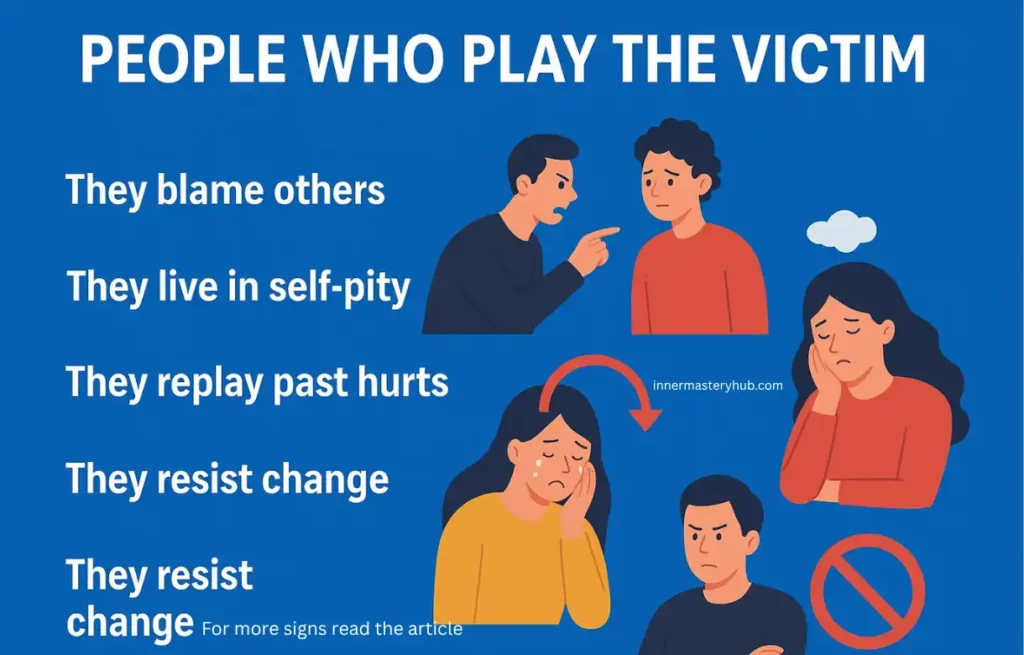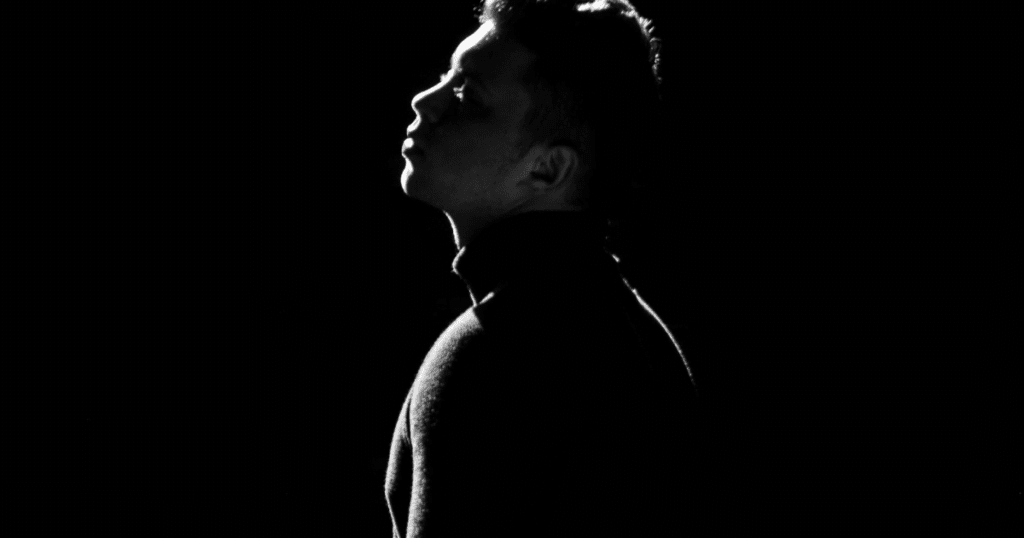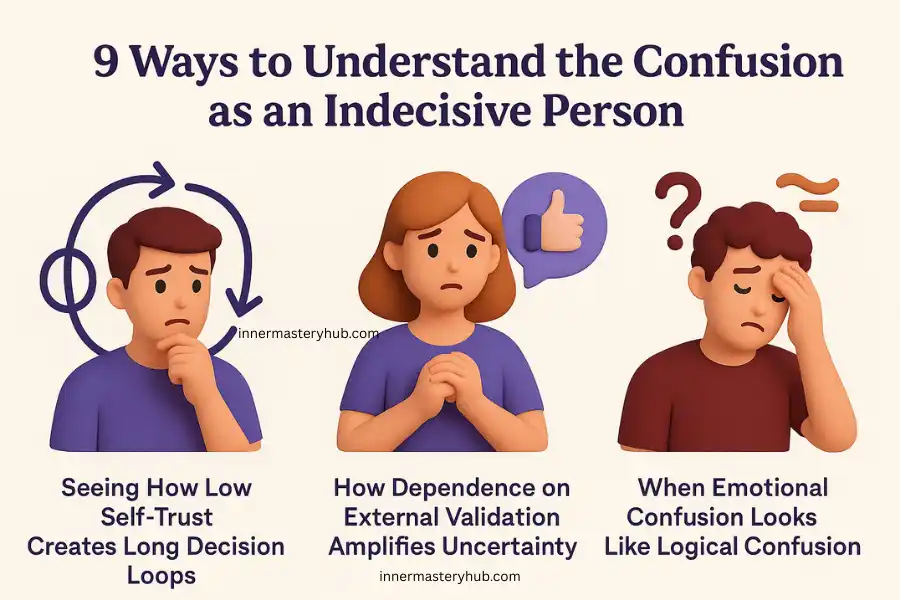15 Tell-tale Signs of People Who Play the Victim

Have you noticed people who constantly blame their circumstances for the ups and downs in their lives?
They constantly blame others or circumstances for their problems. Nothing is ever their fault.
In conversations, they redirect criticism back to you, making you feel guilty for questioning them. They use phrases like, “You just don’t understand how hard it is for me,” or “This always happens to me.”
People who play the victim rarely look for solutions, preferring to dwell on the problem to get sympathy and attention. This pushes responsibility onto everyone else, making their relationships feel one-sided and exhausting.
15 Red Flags to Spot When Someone is Playing The Victim
While going through life, you cannot avoid everyone; therefore, learning ways to deal with someone who plays the victim is inevitable.
They Avoid Responsibility.
When someone is playing the victim, you’ll observe that they never take full responsibility. Their first reaction when anything goes wrong is to blame someone else, such as a family member, a coworker, or simply “bad luck.” It allows them to avoid taking responsibility for their part in the circumstance.
They Crave Constant Reassurance.
They have an endless hunger for approval and pity. They will tell you their stories again and over again, not to solve the problem, but only to hear you agree, “You’re right, that’s so unfair.” For people around them, this continual need for validation can be emotionally taxing.
They Focus Only on the Negative.
Pessimism affects their entire worldview. People who play the victim focus only on the negative, disregarding any positive aspects or potential bright spots. This negative focus fuels their belief that life’s hardships uniquely target them.
They Struggle with Problem-Solving.
When they face a challenge, they freeze. Because they believe they are powerless, they don’t even try to find a way out. Instead of asking, “How can I fix this?” they proclaim, “I can’t fix this,” reinforcing their victim identity.
They Manipulate with Guilt.
In their dealings, this is a necessary tool. They are skilled at making people feel bad about setting limits, being content, or not lending a hand enough. A person’s victim mentality makes you feel like the bad guy, seeking ongoing support and attention.
They Compare Their Struggles.
To prove that their difficulties are worse than others’, they often compare their own to others’. They will respond with an anecdote about how their day was considerably more challenging if you mention a bad day. They do this to keep their position as the one who suffers the most.
They Hold Onto Grudges.
They don’t know what forgiveness is. Years later, people who play the victim will bring up previous offences and scars. Maintaining these grudges enables them to defend their victim narrative and present negative emotions.
They Reject Constructive Advice.
They reject constructive advice. They will quickly shoot it down with a list of reasons why it won’t work if you gently offer a way they might improve their circumstances. They are searching for an audience to affirm that their situation is poor, not for answers.
They Lack Self-Reflection.
They don’t reflect on themselves. They hardly ever, if at all, examine themselves. Analysing their own behaviour and role in an issue is too dangerous. Self-reflection for a person with a victim mentality would include questioning the identity they have created for themselves.
They replay past hurts.
People who play the victim tend to revisit past wrongs. In your life, you may notice someone dragging up old insults or dismissals long after healing should have happened. You may even find yourself doing the same if you recognise this in yourself.
To move forward, you can introduce a deliberate break point in the story. Decide on a cutoff date or moment and say: “I choose to stop revisiting this after today.
They show distorted thinking.
Individuals with a strong tendency toward “interpersonal victimhood” have interpretation biases, attribution biases and memory biases. For example, they misinterpret neutral behaviour as hostile. If you are interacting with someone like this, you might feel that they expect harm, assume the worst, or refuse to trust.
A helpful step is to introduce curiosity rather than assumption. Ask: “Is there another way to interpret this behaviour? Strengthening your flexible thinking cleanses the black-and-white victim filter.
They resist change even when opportunity presents itself
People who play the victim role resist taking action because they prefer staying in their comfort zone. The signs include resistance to change and a preference for the passive role of being harmed.
You may notice them saying: “It’s always been this way,” “Nothing will fix it,” or “Why bother?” That resignation feeds the pattern. The remedy is to set very modest, manageable goals. If you think “I’ll fix everything,” it feels too big. Instead, try: “Today I will do one thing differently,” and then reflect on how you felt. Build momentum step by step.

They seek moral superiority through being wronged.
Some people who play the victim get a sense of moral high ground from their suffering—feeling “I’ve been through more than you” or “Look how unfair my life is.” Studies show that this need for recognition is part of the trait called “tendency for interpersonal victimhood.”
You may feel drained if you’re around someone who uses their narrative to one-up others or is always complaining about how they are worse off. The solution is to bring humility and mutuality. Encourage comparing action instead of suffering. You might say: “We both face challenges. What can we try together?” This shifts the conversation from contest to collaboration.
They show low empathy for others while seeking high empathy for themselves
A person with a victim mentality shows less trust in others and is less willing to help, especially in uncertain situations. In your life, you may find someone who expects others to listen endlessly to their pain but becomes impatient or dismissive when you share yours.
To counter this, you can practise balanced empathy. When you feel triggered by that attitude, try saying internally: “I feel unheard too. How can I express that?” Or externally: “I’m struggling now—can we both share and then move on?”
They lose sight of their own agency and become stuck
When someone is playing the victim mentality, they believe they have no control, they are powerless, and life just happens to them. The very definition of a victim mentality is feeling little control over one’s life.
You might feel stuck, watching life go by, waiting for someone else to act or rescue. If this resonates, you might ask: “What am I waiting for? What can I initiate?”
The way out is to reclaim choice, even small ones. Choose how you talk to yourself, choose one action for the day, and choose who you spend time with. Each small choice restores a sense of agency.
FAQs about People Who Play The Victim
What does it mean when someone plays the victim?
It means a person constantly sees themselves as the one being wronged. They blame others for their problems instead of taking responsibility. This behaviour helps them avoid accountability and gain sympathy or attention, often keeping them stuck in unhealthy emotional patterns.
How can I tell if I am playing the victim?
You might notice yourself often blaming others, feeling powerless, or believing life is unfair to you. You may resist change or struggle to see your role in problems. Frequent self-pity or the expectation that others will fix things are also signs that you may be playing the victim.
Why do some people always act like the victim?
Many act like victims because it helps them avoid guilt, shame, or responsibility. It can come from past trauma, learned helplessness, or fear of failure. Playing the victim can also draw sympathy from others, providing emotional comfort or attention they crave but cannot express directly.
What are the signs of a person with a victim mentality?
Signs include constant blaming, negative self-talk, focusing on unfairness, feeling powerless, and avoiding accountability. People with this mindset often exaggerate hardships and expect others to rescue them. They may also replay past hurts, resist advice, and view themselves as always being mistreated.
Is it a personality disorder when someone is playing the victim?
No, it isn’t classified as a personality disorder, but it can appear alongside traits found in narcissistic or borderline personalities. It’s more of a learned behaviour or coping style that becomes habitual. Therapy can help uncover deeper emotional causes behind the repeated victim mindset.
Can someone playing the victim always recover?
Yes. Recovery begins with self-awareness and a willingness to change. Learning to take responsibility, practising gratitude, and focusing on what you can control helps. With support from therapy or honest self-reflection, it’s possible to build confidence and completely break the habit of a person with a victim mentality.
How does a person’s victim mentality affect relationships?
It creates emotional imbalance. One person feels drained by constant complaints, while the other feels unheard. Over time, trust and closeness fade when one partner refuses to take responsibility. The relationship often becomes tense, repetitive, and exhausting for both sides, blocking honest communication and growth.
What triggers a person’s victim mentality?
Triggers often include rejection, criticism, or failure. These experiences can reactivate old feelings of helplessness or trauma. When people feel insecure or threatened, they may slip into victim Mode to protect their ego and gain sympathy rather than confronting uncomfortable emotions directly.
What strategies help someone stop playing the victim?
Start by accepting personal responsibility and focusing on what you can control. Practise gratitude, challenge negative thoughts, and stop replaying past hurts. Build problem-solving skills and surround yourself with honest, supportive people who encourage accountability instead of feeding your victim mindset.
When should someone seek therapy for a victim mindset?
Therapy is helpful when feelings of helplessness, resentment, or self-pity become constant and interfere with relationships or goals. If you feel stuck in blame or emotional pain despite trying to change, a therapist can guide you to rebuild confidence and healthier coping habits.






